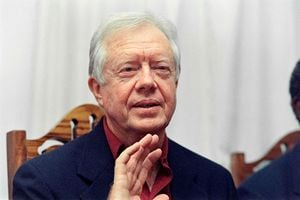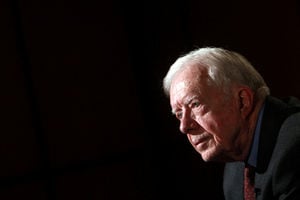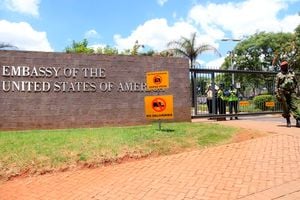
Former US President Jimmy Carter.
One of the most tragic crises to hit the presidency of Jimmy Carter — America’s 39th President who died on December 29, 2024 aged 100 — was the Iran hostage situation of 1979.
On November 4, 1979, radical supporters of the Islamic revolution occupied the American embassy in Tehran. Some 52 US citizens were taken hostage, triggering an international diplomatic crisis.
While the world watched the happenings with bated breath, Kenya’s President Daniel arap Moi, seeing some kindred spirit in fellow born-again President Carter, made a move that some found confounding. In place of diplomatic efforts, President Moi called for a national day of prayer in Kenya and followed it up with letters to other heads of state, urging them to do the same.
Writing in ‘Accidental Diplomats: Americans Missionaries and the Cold War in Africa,’ Dr Philip Dow says that Moi’s unique action had a profound effect on President Carter.
In a letter written a month after the crisis began, Carter thanked Moi in the most religiously intimate terms. Dow — who was born in Ethiopia to American missionaries and attended the Rift Valley Academy in Kenya — writes, quoting the US President: “Words cannot express the deep appreciation (First Lady) Rosalyn and I have for your concern and care that you have demonstrated for us during these days.
Thank you for the spiritual leadership you have given throughout the world at this time to call the people of all nations to pray…we are very grateful for your personal expressions of love in Christ and the prayers of you and your countrymen” Dow’s book explores how, in the Cold War era pitting America against the United Soviet Socialist Republics (USSR), Uncle Sam leveraged on an area where it had comparative advantage over the Russians: Christian missionaries.
Carter and Moi were not strangers to each other. As the vice president to Mzee Jomo Kenyatta, Moi was in the sights of the Americans, who were convinced that he would soon occupy State House.
So much so that Moi had the rare chance when he was vice president to meet with both Presidents Richard Nixon and Jimmy Carter at different times.
Eventually, on February 19, 1980, President Moi, who had taken over after Mzee Kenyatta’s death in October 1978, started an official State Visit to the United States at the invitation of President Carter. It was the first ever such visit by a Kenyan Head of State.
“He (Moi) and I have gotten to be good friends through our frequent communications with one another as we met the increasing challenges and dangers of people who are determined to live in freedom. We share moral values, we share religious faith, and we share political values as well, not only on a personal basis but among the people of our two countries,” said President Carter.
On the 1979 Iran hostage crisis, President Carter told Moi: “We are also particularly grateful as a nation to the people of his country and to President Moi for their unswerving support for us in the trying times since the innocent American diplomats were captured by militants in Iran and held hostage.
President Moi has used his influence on a political basis to intercede for those hostages held captive and has also led other deeply religious nations, on his own initiative, in calling for a day of prayer and personally led a prayer meeting in his country for the safety and wellbeing and the freedom of the American hostages.
This is particularly important to us, and I want to thank him from the bottom of my heart, as the leader of our Nation, for this initiative on his part.”
Carter and Moi would again meet over the years, including in March 1988 when the then former US President came to Nairobi as chairman of his Global 2,000 environmental foundation. He was also scheduled to meet Agriculture Minister Elijah Mwangale and attend a UN environment meeting.
Carter wore his faith on his sleeves right from when he started politics in his native Georgia, where he grew up on a peanut farm, and it came to define who he was and the kind of politics and humanitarian work he was involved in.
Writing in Christianity Today, the world’s largest Christian newspaper, David R. Swartz, who teaches history at Asbury University, says that nearby to Plains, Georgia, where Carter was born, was the interracial Koinonia Farm.
It is critical to mention that it was a mixed-race farm because by the time Carter was born in 1924, racial segregation was alive and nowhere else in America was this practice more entrenched than the South of the country where Georgia is located.
“Carter, described by biographer Randall Balmer as a ‘restless man, consumed by a kind of frenetic benevolence,’ has been a strong supporter of Habitat for Humanity, which grew out of Koinonia Farm,” Swartz writes.
Habitat for Humanity, to which Carter volunteered into his sunset years — as well as teaching Sunday school — has helped to build homes for thousands of people across the globe, including Kenya.
On leaving the White House in 1981 as a one-term president, after losing to Ronald Reagan, he started the Carter Centre which, Swartz notes, “has sought to confront human rights violations, eradicate disease, and reconcile warring parties in Haiti, Guyana, Ethiopia, Korea, and Serbia. His efforts won him the Nobel Peace Prize in 2002.”.
The Centre has been a permanent feature in Kenyan elections as observers, writing incisive reports after each poll.
For example, writing on the 2022 elections, the Centre said: “The mission concluded that the use of technology, particularly a public portal to display results submitted at polling station level, largely increased public confidence in the process.”
Back to Carter. His politics gave America a breath of fresh air — a hardcore believer who sought to change the status quo.
One of the controversies he raised was when he had just announced that he would contend to be the Democratic Party presidential candidate.
He went ahead to do an interview with the popular pornographic Playboy magazine, raising a storm.
“Secular pundits mocked his prudish confession of ‘adultery in my heart’ and characterized him as a ‘redneck Baptist with a hotline to God.’ Conservative Christians — who would not admit to having read the interview in the pornographic magazine —lambasted his use of…(a swear word) and said someone with the moral character to lead the United States would not have granted an interview to the salacious magazine in the first place.”
All in all, Carter demonstrated that even the ‘dirty’ game of politics can be played clean if the players themselves are clean.











